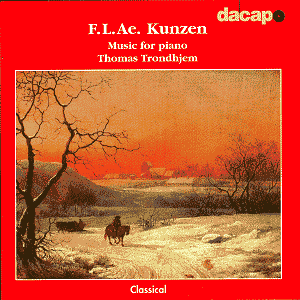Friedrich Ludwig Aemilius Kunzen is one of the
more obscure figures from the Classical era, but during his life
he attained a lofty reputation as a composer and orchestral director.
Born in Lübeck of a musical family, Kunzen eventually settled
in Copenhagen and was in great demand from even the King of Denmark.
I first became familiar with Kunzenís music through
a Dacapo release of the opera "Holger Danske"; his most
well known composition. Although Kunzen recordings are a rare
event, reviewers have uniformly found his music entertaining and
expertly crafted.
The Trondhejm disc contains the entire documented
piano music of Kunzen. However, there are likely many more pieces
based on letters from the time that indicate that Kunzen also
composed a piano concerto in addition to other piano works. Unfortunately,
these pieces have vanished without trace, and
we have to content ourselves with the sixteen works on this disc.
Kunzenís piano music bears similarity with Haydnís
in terms of sparkle, flow, and humor, but Haydnís music is more
diverse, complicated and emotionally rich. Except for the Sonata,
Kunzenís keyboard music is for domestic consumption and can be
played by amateurs. A few of the pieces such as the Scherzandos
in G major and C major are very simple and rather shallow, but
most of the music is quite alluring and possesses delightful turns
of phrasing and attractive pacing.
The three works involving variations on a basic
theme are particularly rewarding as Kunzen displays a knack for
giving each variation its own identity while maintaining a coherent
flow. In fact, it is the Kunzen musical flow that I find most
appealing throughout the disc; he was not one to indulge in long
pauses and always kept his music moving forward. This is an important
consideration in Kunzenís piano music, because long pauses and
intervals would only reveal the lack of emotional depth.
Both the "Musical Pastime for the Fair Sex"
and "Musical New Yearís Gift for the Fair Sex" consist
of six pieces connected through date of composition and the wishes
of publishers. Although it is unlikely that Kunzen intended these
pieces to be grouped together, their combination does present
the maximum variety inherent in his music.
Kunzenís Sonata in C sharp minor is somewhat
unusual for its time in its use of four movements and the key
of C sharp minor. This work requires greater virtuosity than his
other piano music but still remains relatively light in nature.
Very appealing is the 2nd movement having two minuets,
the first quick and demonstrative, the second slower and dream-like.
The Presto is also impressive with its generous use of counterpoint
and exciting forward momentum.
Thomas Trondhejm, born in 1954, is best known
for his four discs of solo piano music by the composer Friedrich
Kuhlau who was born 25 years after Kunzen. Trondhejm certainly
has his pulse on the music of Kunzen, fully conveying its lift
and exuberance. He plays a modern piano, but idiomatic performances
such as his transcend the issue of period vs. modern instrument.
The recorded sound is vibrant with plenty of air and clarity.
The Trondhejm disc should appeal to enthusiasts
of piano music from the Classical era. Just donít expect to hear
another Haydn or Mozart, because Kunzenís artistry is at a much
lower level. Also, there is some merit to the view that his music
doesnít hold up well under concentrated listening.
Although I can only give the disc a mild recommendation,
it is unlikely that another pianist could champion Kunzenís piano
works with greater success than Trondhejm. Further, additional
recordings of this music are not likely within the next few years.
If you desire Kunzenís piano works, Trondhejm is an excellent
guide as well as being the only game in town.
Don Satz
